Nurses and ambulance staff have ramped up the pressure on Health Secretary Wes Streeting by rejecting his offer of a 3.6 per cent pay rise.
Members of the GMB union voted by a majority of more than two thirds (67 per cent) to go back to the negotiating table.
The union has now written to the Secretary of State demanding an ‘urgent meeting’ to discuss pay and ‘other issues of significant importance’ to its NHS members.
GMB national secretary Rachel Harrison said: ‘We await his reply with interest.’
AGMB spokesman said the chances of more strike action were ‘very limited’ because ‘the appetite isn’t there’, but added: ‘Workers are unhappy, which is why they have rejected this offer.’
The GMB represents around 50,000 ambulance workers and 30,000 nurses, midwives and other NHS staff.
It comes as 50,000 resident doctors – formerly known as junior doctors – started a five-day walkout over pay.
One defied militant union bosses by crossing the picket line and reporting for duty, warning strikes may destroy vital public trust in the NHS.
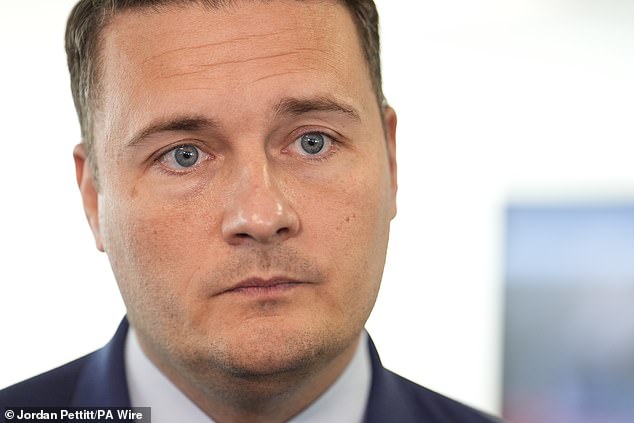
Health Secretary Wes Streeting, pictured on Friday as 50,000 doctors walked out over demands for a 29 per cent pay rise
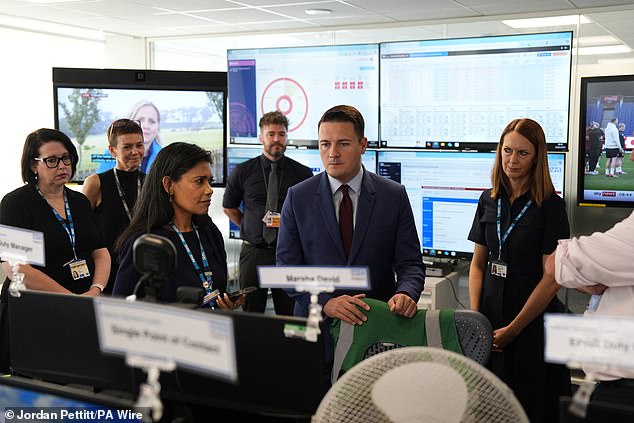
Mr Streeting visited the NHS National Operations Centre in London, saying he would not allow the BMA to ‘hold this country to ransom’
Dr Adam Boggon broke ranks with striking colleagues and claimed the BMA was ‘not necessarily in the same place as much of the profession’.
The psychiatrist at Royal London Hospital in Whitechapel, East London, said he was ‘alarmed’ that the BMA was willing to lose public support in pursuit of an inflation-busting 29 per cent pay rise.
‘I am not willing to pay that price,’ he told Times Radio. ‘The relationship between the doctor and the patient is based on trust and confidence. If we do damage to that basic relationship, that’s bad for everyone.’
He added: ‘My education was funded by the taxpayer. Negotiation isn’t about making unilateral demands and then walking away, or badmouthing a whole profession either.
‘I think that both of these protagonists – the union and Mr Streeting – can do a lot better than they are at the moment.’
The BMA revealed it had told three members to skip the strike and return to work this weekend for patient safety – a trainee paediatrician on the neonatal intensive care unit at Nottingham City Hospital and two anaesthetists at University Hospital Lewisham in south London.
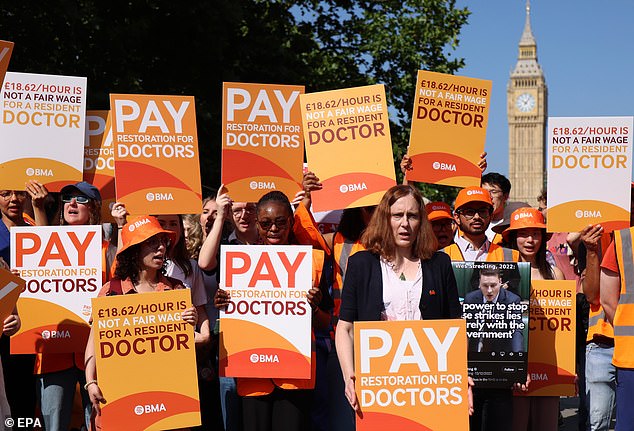
Strike leader Dr Melissa Ryan (front) joined a picket line outside St Thomas’ hospital in Westminster, London, on Friday
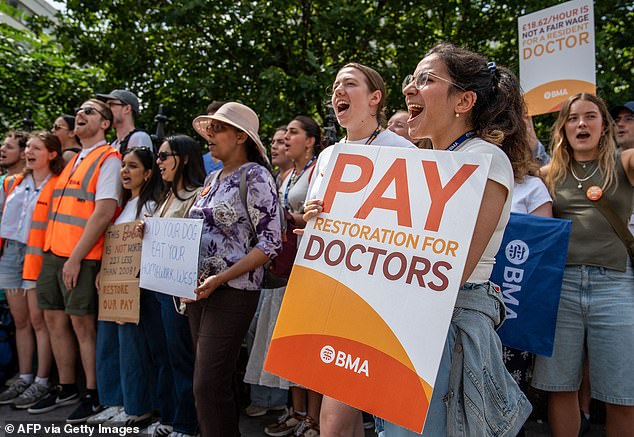
Resident doctors say their pay should be returned to the level it would have been if the 2008 financial crisis hadn’t happened
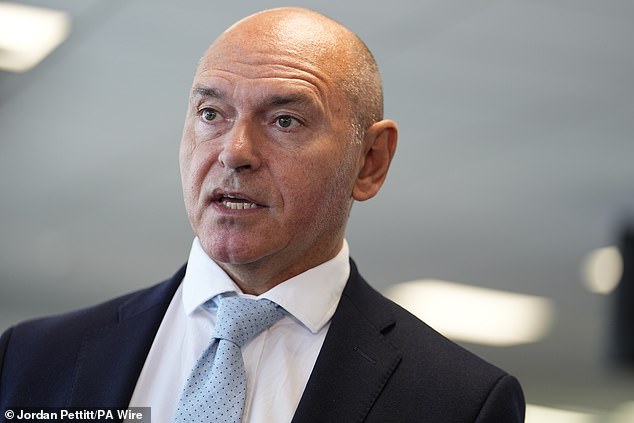
NHS chief executive Jim Mackey said he hopes the BMA will return to the negotiating table so the health service can return to business as usual
Dr Melissa Ryan, who is leading the BMA strike alongside Dr Ross Nieuwoudt, joined a picket line outside St Thomas’ Hospital in Westminster, London.
She told members: ‘We have a government that wants to divide us, but we are stronger than that.
‘I encourage you to hold the line, strike hard, and wait for the government to come back and make the next move with a credible offer.’
Striking doctors waved banners including ‘Do no harm – except to our bank balances!’ and ‘Why is my assistant paid more than me?’
Dr Emre Karaduman, 27, who works at Ealing Hospital, west London, said: ‘Our pay has been degraded since 2008. I know there was a financial crisis, but doctors shouldn’t have to pay the price for that.
‘If Wes Streeting wants us to help cut the patient waiting list, he needs to give us full pay restoration.’
One doctor from Chelsea and Westminster hospital, who gave her name as Naiha, 25, accused Mr Streeting of ‘guilt tripping’ doctors by claiming lives would be put at risk – and rejected comparisons between doctors and other public officials who have not received such large pay rises.
‘It’s pointless trying to compare doctors to other professions,’ she said. ‘If people in other sectors feel hard done by, I would urge them to strike as well. I think everyone deserves to be paid a living wage, and right now ours barely scratches the surface.’
Another who gave his name as Joe, 26, added: ‘Medicine is an incredibly important career. We go through a massive amount of training and take on a lot of risk and responsibility that people in other sectors don’t. But I’ve got a friend in finance whose bonus last year was more than double my salary.’
Mr Streeting condemned the strike as ‘reckless, unnecessary and unreasonable’, as resident doctors have already received inflation-busting pay rises totalling 28.9 per cent over three years.
‘A 28.9 per cent pay rise and a government that was willing to work with them are not grounds for strike action,’ he said. ‘This government will not allow the BMA to hold the country to ransom.
‘We are doing everything we can to minimise the risk to patients, but I want to be honest with people – what we can’t do is eliminate disruption or risk.
‘However much the BMA try and sugar-coat it, what they are fundamentally doing today is forgetting the three words that should be at the forefront of every doctor’s mind every day: Do No Harm.’
He added an ‘amazing mobilisation’ by other NHS staff, including senior doctors cancelling annual leave, had helped ‘keep the show on the road’.
‘We are also seeing lots of resident doctors turning up to work today, ignoring their union because they want to be there for patients too,’ he said.
‘This is going to be a disruptive five days, but I am extremely grateful to NHS staff and leaders who are working their socks off to minimise the disruption.’
Some elective procedures will have to be cancelled or delayed due to the strikes, extending waiting lists. The BMA has suggested this is no great hardship, but Mr Streeting said patients who have been waiting a long time for such procedures ‘do come to harm’.
BMA council chairman Dr Tom Dolphin told the Today programme it was ‘very disappointing to see a Labour Government taking such a hard line against trade unions’.
Resident doctors are qualified doctors in clinical training. They have completed a medical degree and can have up to nine years of working experience as a hospital doctor, depending on their specialty, or up to five years of working and gaining experience to become a GP.
On Friday, NHS chief executive Jim Mackey said he hoped the BMA would come back to the negotiating table.
‘I would hope that after this, we will be able to get people in a room and resolve the issue,’ he said. ‘We could be doing this once a month for the next six months, so we’ve got to organise ourselves accordingly.’












